- Home
- Ian Mcewan
Sweet Tooth Page 17
Sweet Tooth Read online
Page 17
But I wasn’t only thinking of Tom. I was also worrying about Shirley. Six weeks had passed since our parting at the Bees Make Honey gig. She had left her place, her desk at the Registry, at the end of a working week without saying goodbye to anyone. Three days later a new new-joiner was in her place. Some of the girls who had gloomily predicted Shirley’s promotion were now saying that she was forced to leave because she was not one of us. I’d been too angry with my old friend to seek her out. At the time I was relieved that she crept away without a fuss. But as the weeks passed, the sense of betrayal faded. I began to think that in her place I would have done the same. Perhaps with greater willingness, given my hunger for approval. I suspected that she’d been wrong – I wasn’t being followed. But I was missing her, her boisterous laugh, the heavy hand on my wrist when she wanted to confide, her carefree taste for rock and roll. By comparison, the rest of us at work were timid and buttoned up, even when we were gossiping or teasing each other.
My evenings now were empty. I came home from work, took my groceries from ‘my’ corner of the fridge, cooked my supper, passed the time with the solicitors if they happened to be around, then read in my room in my boxy little armchair until eleven, my bedtime. That October I was absorbed by the short stories of William Trevor. The constrained lives of his characters made me wonder how my own existence might appear in his hands. The young girl alone in her bedsit, washing her hair in the basin, daydreaming about a man from Brighton who didn’t get in touch, about the best friend who had vanished from her life, about another man she had fallen for whom she must meet tomorrow to hear about his wedding plans. How grey and sad.
A week after my meeting with Haley I walked from Camden to the Holloway Road with all kinds of foolish hopes, and apologies at the ready. But Shirley had abandoned her room and had left no forwarding address. I didn’t have her parents’ address in Ilford and they wouldn’t give it to me at work. I looked up Bedworld in the Yellow Pages and spoke to an unhelpful assistant. Mr Shilling could not come to the phone, his daughter didn’t work there and might or might not be away. A letter addressed to her care of Bedworld might or might not reach her. I wrote a postcard, unnaturally cheery, pretending nothing had happened between us. I asked her to get in touch. I didn’t expect a reply.
I was due to meet Max on his first day back at work. That morning I had a miserable time getting to the office. Everyone did. It was cold and the rain fell in that steady, pitiless way it has in a city, letting you know it could go on for a month. There was a bomb scare on the Victoria line. The Provisional IRA had phoned a newspaper and given a special code. So I walked the last mile to the office, past queues for buses, too long to be worth joining. Part of the fabric of my umbrella had come away from the spokes, which gave me the appearance of a Chaplinesque tramp. My court shoes had cracks in the leather that sucked in the damp. On the news-stands every front page carried the story of OPEC’s ‘oil price shock’. The West was being punished with a hefty rise for supporting Israel. Exports to the US were embargoed. The leaders of the mineworkers’ union were holding a special meeting to discuss how best they could exploit the situation. We were doomed. The skies grew darker over the Conduit Street crowds shuffling along, hunched into their raincoats, trying to keep their umbrellas out of each other’s faces. It was only October and barely four degrees above freezing – a taste of the long winter to come. I thought back gloomily to the talk I’d attended with Shirley, and how every vile prediction was coming true. I remembered those turned heads, those accusing looks, my black mark, and my old anger against her revived and my mood darkened further. Her friendship had been a pretence, I was a dupe, I belonged in another line of work. I wished I was still in my soft sagging bed with the pillow over my head.
I was already late but I checked the PO Box first before running round the corner to Leconfield House. I spent a quarter of an hour in the women’s bathroom, trying to dry my hair on the roller towel and wiping the puddle stains from my tights. Max was a lost cause but I had my dignity to protect. I was ten minutes late when I squeezed into his triangular office, conscious of how cold and wet my feet were. I watched him across his desk as he arranged his files and made a show of being business-like. Did he look different after a week of making love in Taormina to Dr Ruth? He’d had a haircut before coming back to work and his ears had reverted to jug formation. There was no gleam of new confidence in his eyes, or dark patches beneath them. Beyond the new white shirt and a tie of a darker blue and a new dark suit, I saw no transformation. Was it just possible that they took separate rooms to save themselves for their wedding night? Not from what I knew of medical types and their long and rowdy apprenticeships. Even if Max, in obedience to some improbable instruction from his mother, had made a half-hearted attempt to hang back, Dr Ruth would have eaten him alive. The body, in all its frailty, was her profession. Well, I still wanted Max, but I also wanted Tom Haley and that was protection of a sort, if I ignored the fact that he wasn’t interested in me.
‘So,’ he said at last. He looked up from the Sweet Tooth file and waited.
‘How was Taormina?’
‘Do you know, it rained every day we were there.’
He was telling me they had stayed in bed all day. As if acknowledging the fact he added quickly, ‘So we saw the inside of a lot of churches, museums, that kind of thing.’
‘Sounds fun,’ I said in a flat tone.
He glanced up sharply, ready to detect irony but, I think, saw none.
He said, ‘Have we heard back from Haley?’
‘Not yet. The meeting went well. Clearly needs the money. Can’t quite believe his luck. Came up to town last week to check out the Foundation. I guess he’s mulling it over.’
It was odd how, in putting it this way, I cheered myself up. Yes, I thought. I should try to be more sensible.
‘What was he like?’
‘Very welcoming actually.’
‘No, I mean, what is he like?’
‘No fool. Highly educated, very driven about his writing, obviously. Students adore him. Good-looking in an unusual sort of way.’
‘I’ve seen his photograph,’ Max said. It occurred to me that he might be regretting his mistake. He could have made love to me and then announced his engagement. I felt I had a duty to my self-respect to flirt with Max, make him sorry for passing me over.
‘I was hoping for a postcard from you.’
‘Sorry, Serena. I never write them – just not in the habit.’
‘Were you happy?’
The directness of the question took him by surprise. I was gratified to see him flustered. ‘Yes, yes we were in fact. Very happy. But there’s …’
‘But?’
‘There’s something else …’
‘Yes?’
‘We can talk about holidays and all that later. But before I tell you about it, still on Haley, give him another week, then write to him and say we need to hear from him straight away, or else the offer is withdrawn.’
‘Fine.’
He closed the file. ‘The thing is this. Remember Oleg Lyalin?’
‘You mentioned him.’
‘I shouldn’t know any of this. And you certainly shouldn’t. But it’s gossip. It’s going the rounds. I think you might as well know. He was a great coup for us. He wanted to come across in ‘seventy-one but apparently we kept him in place here in London for a few extra months. Five was about to arrange his defection when he was picked up by Westminster police for drunk driving. We got to him before the Russians did – they would have certainly killed him. He came across to us with his secretary, his lover. He was a KGB officer connected to their sabotage department. Pretty low-level guy, something of a thug apparently, but priceless. He confirmed our worst nightmare, that there were dozens, scores of Soviet intelligence officers working here under diplomatic immunity. When we threw out the hundred and five – and by the way, Heath was a trouper on that, whatever they’re saying about him now – it seemed to take Moscow Ce
ntre completely by surprise. We didn’t even tell the Americans, and that caused a stink which hasn’t quite settled down yet. But the important thing was that it showed that we no longer had a mole at any significant level. Nothing since George Blake. Huge relief all round.
‘We’ll probably go on talking to Lyalin until the end of his life. There are always loose ends, things in the past, old stories with a new angle, procedural stuff, structures, order of battle and so on. There was one particular minor mystery, a cryptonym no one could crack because the information was too vague. It was an Englishman codenamed Volt, active in the very late forties until the end of ‘fifty, working for us, not Six. The interest was the hydrogen bomb. Not really our department. Nothing spectacular like Fuchs, nothing technical. Not even long-range planning or logistics. Lyalin saw the Volt material when he was still in Moscow. It didn’t add up to much, but he knew the source was Five. He saw some speculative things, you know, “What if” papers, what the Americans call scenarios. What we call smart weekends in country houses. Hot air. What happens when the Chinese get the bomb, what price a pre-emptive strike, what’s the optimum stockpile assuming no cost restraints and kindly pass the port.’
It was at this point I guessed what was coming. Or my body knew. My heart was going a little harder.
‘Our people spent months on this, but we had too little on Volt to match the payroll or anyone’s biography. Then last year someone came over to the Americans through Buenos Aires. I don’t know what our friends learned. I do know they were slow passing it across, still huffy about the expulsions, I expect. Whatever they gave us, it was enough.’
He paused. ‘You know where this is leading, don’t you?’
I went to say ‘Yes’, but my tongue couldn’t move itself in time. What came out was a grunt.
‘So this is what’s going round. Twenty-odd years ago Canning was passing documents to a contact. It lasted fifteen months. If there was more damaging stuff, we don’t know about it. We don’t know why it stopped. Perhaps it was disappointment all round.’
While I was in my well-sprung royal blue pram with silver spokes, still an only child, wheeled in bonneted splendour from the Rectory to the village shops, Tony was doing business with his contact, trying out a few phrases in Russian in that show-off way he had. I saw him in a bus-station greasy spoon, pulling from the inside pocket of a double-breasted suit a folded brown envelope. Perhaps an apologetic smile and shrug because the material was not first grade – he liked to be the best. But I couldn’t quite see his face. In the past few months, whenever I summoned it, the image dissolved before the inner eye. Perhaps that was why I’d been less tormented. Or, other way round, my fading grief had begun to erase his features.
But not his voice. The inner ear is the more acute organ. I could play Tony’s voice in my mind like turning on a radio. A way he had of resisting until the very end the rising pitch of a question, the hint of a ‘w’ sound for an ‘r’, and certain phrases of demurral – ‘If you say so’, ‘I wouldn’t put it like that’, ‘Well, up to a point’ and ‘Hang on’ – and the college-claret plumminess, his way of being so sure that he would never think or say anything stupid or extreme. Only the considered, balanced view. Which was why it was easy to summon up his explanation over breakfast in the cottage, early summer sunshine pouring through the open door with its countless inexplicable rivets, across the flagstones, to illuminate the lime-white lath and plaster of the dining room’s far wall, where the Churchill watercolour hung. And on the table between us, muddy coffee made in a special way, by ‘the jug method’ with a pinch of salt thrown in, and undercooked toast like stale bread piled on a pale green plate with a spidery glaze and bitter thick-cut marmalade made by the housekeeper’s sister.
I heard it plainly, Tony’s justification, which, his tone would suggest, only a fool dared oppose. My dear girl. I hope you remember our first tutorial. These terrifying new weapons can only be restrained by a balance of power, by mutual fear, mutual respect. Even if it means yielding secrets to a tyranny it would be preferable to the lopsided dominion of American swagger. Kindly recall the voices from the American right after 1945 urging the nuclear extermination of the Soviet Union while it still had no means of retaliation. Who could ignore that insidious logic? If Japan had possessed such a weapon there would have been no horrors of Hiroshima. Only a balance of power can keep the peace. I did what I had to. The Cold War was upon us. The world had arranged itself into hostile camps. I wasn’t alone in thinking the way I did. However grotesque its abuses, let the Soviet Union be similarly armed. Let small minds accuse me of unpatriotic betrayal, the rational man acts for global peace and the continuance of civilisation.
‘Well,’ Max said. ‘Don’t you have anything to say?’
His tone suggested that I was complicit or somehow responsible. I allowed a short silence to neutralise his question. I said, ‘Did they confront him before he died?’
‘I don’t know. All I have is the gossip that trickles down from the fifth floor. They certainly had time – about six months.’
I was remembering the car that came with the two men in suits, and the walk I was obliged to take in the woods, and our sudden return to Cambridge. In those first few minutes after Max’s revelation I didn’t feel much at all. I understood the importance of it, I knew that there were emotions lying in wait for me, but I would have to be alone to confront them. For now I felt protected by an unreasonable hostility to Max, by my impulse to blame the messenger. He talked down Tom Haley at every opportunity and now he was demolishing my former lover, trying to strip the men out of my life. He could have kept the Canning story to himself. It was only a rumour and, even if it was true, there was no operational reason for me to be told. It was a rare case of prospective and retrospective jealousy running side by side. If he couldn’t have me, then no one could, not even from the past.
I said, ‘Tony wasn’t a communist.’
‘I expect he dabbled in the thirties like everyone else.’
‘He was in the Labour Party. He hated the show trials and the purges. He always said he would have voted for king and country in that Oxford union debate.’
Max shrugged. ‘I can see it’s hard.’
But he couldn’t, and nor could I just yet.
I went from Max’s room straight to my desk, determined to numb myself with the tasks in hand. It was too soon to be thinking. Or rather, I didn’t dare think. I was in shock and I set about my tasks like an automaton. I was working with a desk officer called Chas Mount, a genial sort, ex-army, a former computer salesman who was happy to give me proper responsibilities. I had at last graduated to Ireland. We had two agents in the Provisionals – there may have been more but I wasn’t aware of them. And these two were not aware of each other. They were sleepers, expected to spend some years rising through the military hierarchy, but almost immediately we’d had a flood of information from one of the men relating to chains of arms supply. We needed to expand and rationalise the files by creating sub-groupings and opening new files on the suppliers and middlemen, with cross-references and a degree of duplicated material that would lead any misplaced enquiry to the right place. We knew nothing about our agents – to us they were only ‘Helium’ and ‘Spade’, but I often thought about them, the dangers they ran and how safe I was back here in the dingy office I so often complained about. They would be Irish Catholic certainly, meeting in tiny front parlours in Bogside or in function rooms in pubs, aware that one slip, one obvious inconsistency could cost a bullet in the back of the head. And the body dumped in the street so that everyone could see what happened to informers. They would have to live the part in order to be convincing. Already, to protect his cover, Spade had seriously injured two British soldiers in an ambush and been involved in the deaths of members of the RUC and the torture and murder of a police informant.
Spade, Helium, and now Volt. After a couple of hours trying to block out Tony, I went to the women’s lavatory, locked myself in a cubicle
and sat there a while, and attempted to take in the news. I wanted to cry, but my turmoil had dry elements of anger and disappointment. It was all so long ago and he was dead, but the act seemed to me as fresh as yesterday. I thought I knew his arguments, but I couldn’t accept them. You let down friends and colleagues, I heard myself tell him at that same sunlit breakfast. It’s a matter of dishonour, and when it gets out, which it’s bound to, this will be the one act you’ll be remembered for. Everything else you achieved will be irrelevant. Your reputation will rest only on this, because ultimately reality is social, it’s among others that we have to live and their judgements matter. Even, or especially, when we’re dead. Your entire existence now will be reduced in the minds of the living to something seedy and underhand. No one will doubt that you wanted to do more harm than you did, that you would have handed over complete blueprints if you could have got your hands on them. If you thought that your actions were so noble and rational, why not present them openly and argue your case in public and face the consequences? If Stalin could murder and starve twenty million of his own for the sake of the revolution, who’s to say he couldn’t sacrifice more for the same cause in a nuclear exchange? If a dictator values life so much less than an American President, where is your balance of power?
Arguing with a dead man in a lavatory is a claustrophobic experience. I came out of the cubicle, splashed my face with cold water and tidied myself up, then went back to work. By lunchtime I was desperate to get out of the building. The rain had stopped and the pavements gleamed cleanly in the surprising sunlight. But there was a biting wind and there was no possibility of wandering idly through the park. I went briskly along Curzon Street, full of irrational thoughts. I was angry with Max for bringing me the news, angry with Tony for failing to live, for abandoning me with the burden of his mistakes. And because he had steered me into my career – I now thought of it as more than a job – I felt myself to be contaminated by his disloyalty. He had added his name to an inglorious list – Nunn May, the Rosenbergs, Fuchs – but unlike them had given away nothing of significance. He was a footnote in the history of nuclear spying, and I was a footnote to his treachery. I’d been diminished. Clearly, Max thought so. Another reason to be angry with him. And I was angry with myself for being a fool about him, for thinking that this stuffy jug-eared idiot could ever have brought me happiness. What luck it was for me, to be inoculated by his ridiculous engagement.

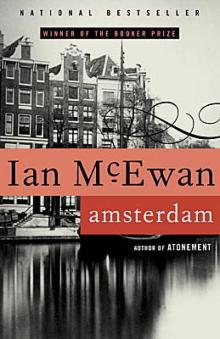 Amsterdam
Amsterdam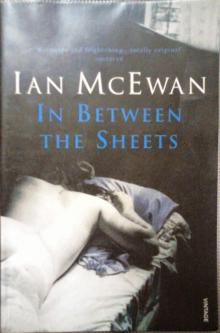 In Between the Sheets
In Between the Sheets Atonement
Atonement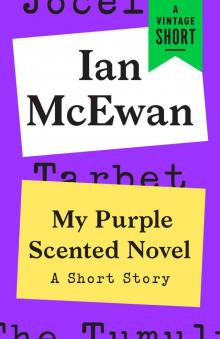 My Purple Scented Novel
My Purple Scented Novel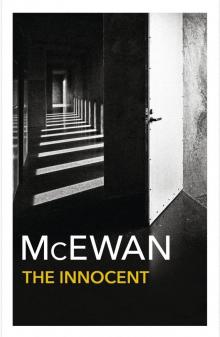 The Innocent
The Innocent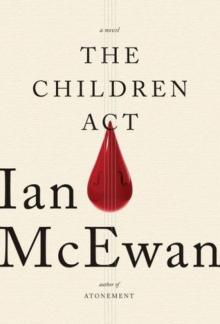 The Children Act
The Children Act Enduring Love
Enduring Love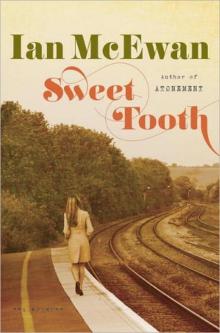 Sweet Tooth
Sweet Tooth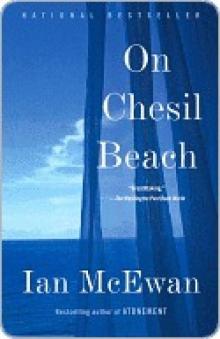 On Chesil Beach
On Chesil Beach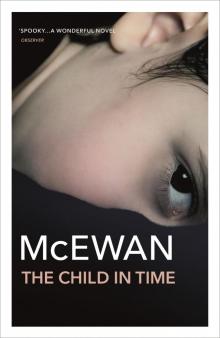 The Child in Time
The Child in Time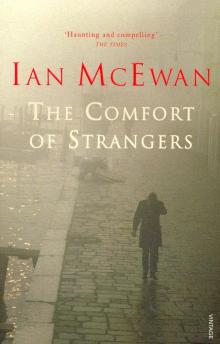 The Comfort of Strangers
The Comfort of Strangers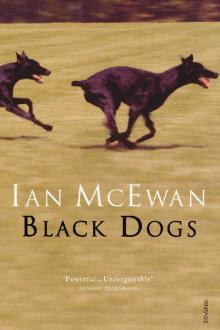 Black Dogs
Black Dogs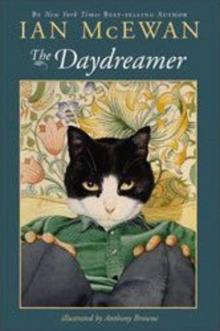 The Daydreamer
The Daydreamer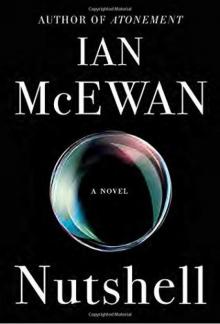 Nutshell
Nutshell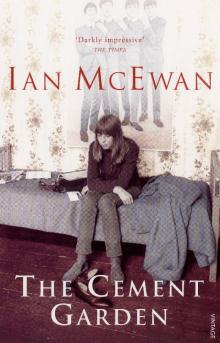 The Cement Garden
The Cement Garden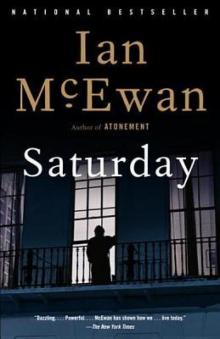 Saturday
Saturday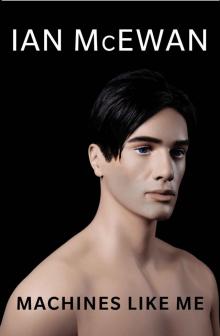 Machines Like Me
Machines Like Me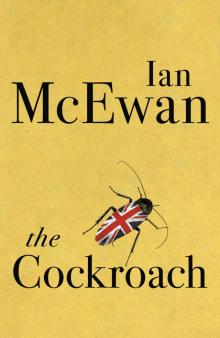 The Cockroach
The Cockroach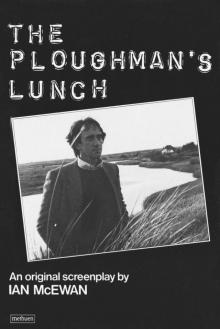 The Ploughman’s Lunch
The Ploughman’s Lunch